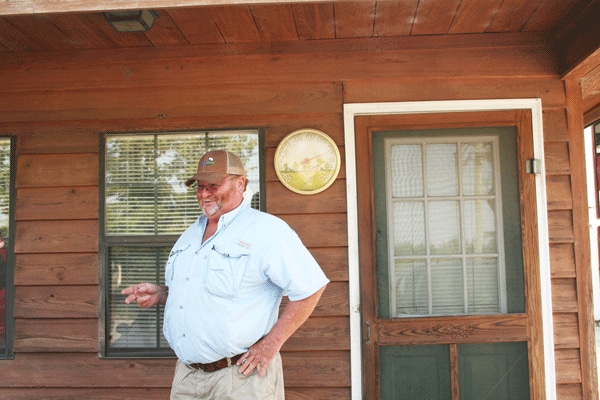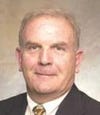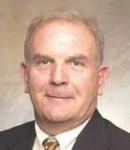
• Mike Harris got into farming in a round about way. He went with some friends to get a farm loan from their local FSA office. When he saw how easily they got loans, he applied, was accepted, but that’s where the fairy tale story ends.• From his meager beginning and despite what most people would call a handicap, Mike Harris built a thriving farming enterprise. Now, he farms several thousand acres, owns part interest in a highly successful cotton gin, and has other successful businesses. But, it didn’t come easy.
December 3, 2010

As a young man, Roper, N.C., grower Mike Harris lost both his legs in an automobile accident. The state told him he could claim disability for life. He didn’t just say no to a life on welfare, he said Hell No, and he’s spent a lifetime making the pledge work.
Harris got into farming in a round about way. He went with some friends to get a farm loan from their local FSA office. When he saw how easily they got loans, he applied, was accepted, but that’s where the fairy tale story ends.
Using his good name and his reputation as being a hard worker, Harris lined up the equipment he needed to get into farming. When he went back to pick up his check from the FSA, he was told there was no money.
Even with both legs at that time, for a 19 year old country boy finding money to pay for equipment and land was a daunting task. The manager of the Ford dealership let him keep a truck he had ordered and even paid for the license plates and arranged for a loan at the local bank.
Next stop was in Elizabeth City, N.C., to tell the tractor dealership he had no money to pay for a tractor he had bought. “Mr. Abbott, who owned the tractor dealership said, “You’re the hardest working youngun’ I know, you’ll pay me for the tractor.”
That was back in 1973. He planted wheat and soybeans and had a great crop and in a matter of a few years made enough money to pay for all his equipment.
In retrospect, Harris says, not getting the farm loan was probably the best thing that ever happened to him. “I learned the hard way that you never take anything for granted in the farming business,” he says.
After spending most of the money he earned that first year to pay hospital expenses, Harris learned the value of insurance. “My aunt told me to go get Blue Cross, Blue Shield insurance and to bring her the policy, so she could make sure I had everything covered,” Harris recalls.
Eight days after his insurance went into effect, he had an automobile accident. By all accounts only the toughest of the tough could have survived the wreck. Though he survived, Harris lost both legs in the accident.
His doctors and rehab therapists told him it would take him two years to learn to walk and to adjust to his artificial legs. The accident happened on March 6, 1975. He was in the hospital for 30 days, rehab for two weeks, walked out of the hospital and harvested his wheat crop a few weeks later.
Built thriving farm enterprise
From his meager beginning and despite what most people would call a handicap, Mike Harris built a thriving farming enterprise. Now, he farms several thousand acres, owns part interest in a highly successful cotton gin, and has other successful businesses. But, it didn’t come easy.
“At one point, I got heavily involved in the potato business. It was hard, hard work, but I loved it. I came home one evening and from walking so much and working long hours, I had blood running from the stumps of my legs.
“My daughters said, ‘Daddy if you’re doing this for us, please don’t — we don’t want you to work yourself to death for us.
“I got my last check for my last potato crop, and I sold what equipment I could sell and took a demolition torch to the rest of it and sold it for scrap metal. I wanted to make sure I didn’t change my mind,” Harris explains.
In 1990, Harris planted the first cotton seed he had ever seen. Though cotton is now a major crop in the Blacklands of eastern North Carolina, at that time virtually no one was growing it.
“I worked with that first 500 acres of cotton every day. I tended to it like a baby and was so proud to make over 1,100 pounds of lint that first year,” he recalls.
By 1995, he was into cotton production big time, but finding the business end of it tough to handle. “I was just tired of it. I’d grow a beautiful crop of cotton and couldn’t seem to make any money with it. So, I decided to get out of the cotton business, he recalls.
Before he took the same action he had done a few years earlier with his potato equipment, Harris got a call from another cotton grower asking if he was interested in becoming a partner in a cotton gin.
“I laughed at him, told him I was trying to get out of the cotton business, but I went to the first meeting they held. There were lots of people at that meeting and at the next one, but when it came time to bring some money to the next meeting, there weren’t but a few people. When it came time to bring the big money to the meeting there were only 10 of us,” Harris says.
“That’s how Coastal Carolina Cotton Gin got started. It’s one of the best moves I’ve ever made in business and it’s been wonderful working with some of the best people I’ve ever met — the most honest, straight-up people I’ve ever been around,” he says.
“When we had a note-burning party, I told them every business has a misfit, and ya’ll got me. I’m proud to be a part of the gin and proud of what we’ve been able to do to help North Carolina cotton farmers,” he adds.
Hurricane problems
The cotton business was all good until a big hurricane hit in 2000. Harris lost 2,000 acres of cotton and had to leverage everything he owned to start over again. “At one point I just sat here (in his office chair) laughing. Then, I went home and cried for a whole day.
Finally, I said to myself, this isn’t Mike Harris, I’m no quitter, so I put it all back together again,” he says with pride. He could easily add that he put it back together bigger and better. That’s not his style — there is a humble, caring side of Mike Harris that’s evident even from the briefest of meetings.
Now, 10 years after his near financial disaster, the farming operation is bigger and better than ever. His daughters Beth Foster and Amy Feyer are both heavily involved in the operation. And, he now has a farming partner, Casey Sawyer.
“I knew Casey was too smart and worked too hard to stay here working for wages, so I’m helping him get started in farming. He and my daughters are trying hard to begin to start taking over some of the farming operation, but it’s hard, real hard to understand how an operation this big works,” Harris says.
Big may be an understatement. Last year Harris farmed over 9,000 acres of land, including 3,500 acres of cotton. He’s planning to increase to 4,500 acres of cotton next year. Plus, he still has involvement in cotton gins and other business operations.
Tough may also be an understatement in explaining the successes Mike Harris has had in agriculture and in life. His reputation as being the toughest of the tough is not always something he’s proud of later in life, but in many ways tough is what has helped him through some very hard times in life and in farming.
About the Author(s)
You May Also Like





